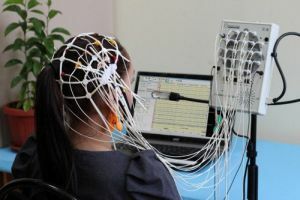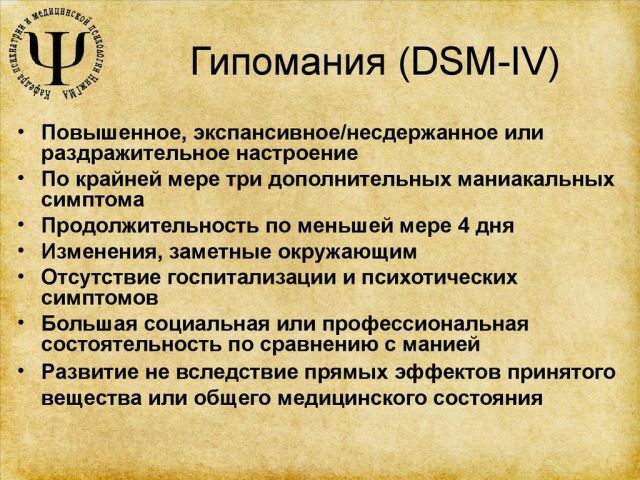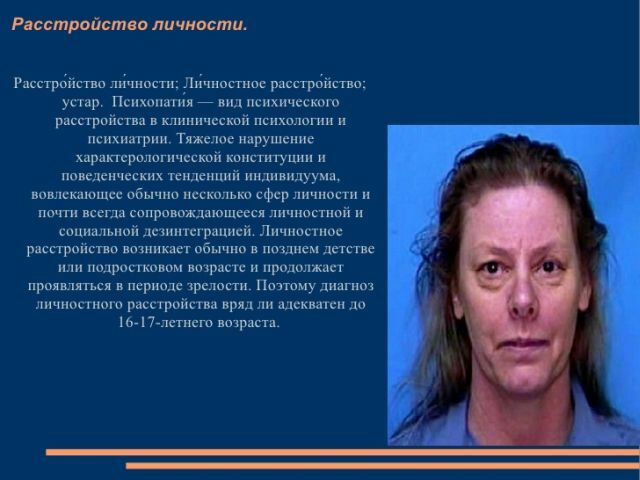 Mania of persecution( in one word paranoia, scientifically correctly called persecute delirium of persecution) is an acute mental disorder in which a patient experiences the belief that a certain person or group of people wants to harm his health or take his life.
Mania of persecution( in one word paranoia, scientifically correctly called persecute delirium of persecution) is an acute mental disorder in which a patient experiences the belief that a certain person or group of people wants to harm his health or take his life.
Most often, most paranoids consider pests of their relatives, neighbors, co-workers, secret organizations, aliens.
A man with persecution mania becomes closed, suspicious, unnecessarily anxious, unable to adequately assess himself and the environment.
Patients with this kind of mental disorder can apply to law enforcement to warn about their fears, fears, anxieties and save their lives. Most often, the alarm is superfluous and is not supported by objective data.
Pursuit of persecution - one of the most common forms of mental disorders. Psychiatrist Vladimir Bekhterev put a severe form of paranoia to Joseph Stalin, referring to the spread of persecution mania among people who have power.
Provoking causes: hypotheses and theories of
The exact causes that trigger the development of persecution mania are unknown. To date, only hypotheses about the influence of various factors on the human psyche are being put forward:
- is a hereditary predisposition to mental illness;

- features of the organization of the central nervous system;
- suffered psychoemotional trauma, - so in most of the work of psychiatrists it is noted that people who survived violence, excessive fear suffer paranoid delusions;
- poisoning with alcohol and its surrogates, which has a negative impact on the brain and the psyche of a person( depending on the psychotype of a person, alcohol to some extent increases anxiety and forms mental disorders);
- reception of narcotic drugs;
- poisoning with neurotoxic drugs;
- presence of a victim complex, in which case the patient feels like a victim and tries to shift some of the responsibility from himself and blame others for his failures;
- stress;
- brain damage of Alzheimer's and Parkinson's;
- effects of stroke;
- an unfavorable psychoemotional atmosphere in the family, at work.
Paranoids - what they feel and how they look on the part of
Identifying the persecution mania is possible due to the characteristic clinical symptoms and signs of delusional ideas. The strangeness of  is noted, the patient begins to complain of excessive anxiety. It seems to him that he is constantly watched, discovers his letters, hacks accounts in social networks.
is noted, the patient begins to complain of excessive anxiety. It seems to him that he is constantly watched, discovers his letters, hacks accounts in social networks.
Most often, persecution mania is diagnosed in elderly people who have undergone various brain lesions( strokes, head trauma, hemorrhages).
It seems to the elderly person that his relatives want him to die. The patient can also complain that unreal creatures can follow him( vampires, werewolves, aliens).
Any sickness in his life relates to the activities of ill-wishers who continuously monitor him and cause harm.
Anxiety is first of an episodic nature, but subsequently acquires a permanent character and causes a person to constantly experience stress and harass their anxiety and anxiety around them. There is an inventing of various facts about really occurring events and their distortion.
The person is in constant readiness to repulse invented attempts of an attack from imaginary enemies. Those who are ill can be afraid to perform various daily activities, for example, cross the road, turn on electrical appliances, etc.
For delirium of persecution is characterized by constant anxiety, expressed in the constant expectation of negative tragic events( bankruptcy, serious illness, death).Thinking can change, which becomes more detailed. Describes all the details and details of surveillance and attempts on the life of the patient. However, the stories do not have a clear structure, accentuated minor points.
The most commonly paranoid delirium is accompanied by supervalued ideas that are completely taken over by a person. There is a formation of erroneous ideas that displace people's consciousness.
Absolutely not perceived any form of criticism, the patient seems that all the words and actions of others are directed to harm him.
There are also difficulties with adaptation in the social environment. Interaction between people is difficult.

Stages of development and immersion in their fictional world
The persecution complex develops gradually in three stages, each with its own symptoms and signs:
- The first stage of the is characterized by the presence of primary signs of paranoia. It begins to show isolation, excessive anxiety, an increased level of anxiety.
- At , the second stage of symptoms is increasing. Behavior becomes more restless, a person is not able to interact with others and adapt to the society. Fear becomes a constant companion, open claims to others begin.
- At the third stage of begins uncontrolled signs of aggression, severe depression develops. In a special category of patients against a background of fears and depression, attempts at suicide are possible. Behavior becomes suspicious and wary. There is a lack of confidence in the people around you. Perhaps misinterpretation of events. The patient does unusual things, which do not correspond to everyday habits. Especially it should be emphasized that all the thoughts of the individual are concentrated on his exceptional personality and the peculiarity of his significance for society. Also characteristic is the desire for self-isolation, aimed at limiting the influence of the environment.
At the initial stage of development, the pursuit mania looks quite harmless, but already during this period, frustration prevents a person from living a full life. Living in constant fear and tension, the patient provokes the development of other mental and physical illnesses. It is especially difficult for relatives and other people who surround such a person.

How to behave to others?
First of all, it is necessary to help the sick person to realize his problem and convince him to turn to a therapist. It is very important to find a specialist who will find an approach to such a patient. From the level of trust in doctors to psychotherapists and psychiatrists, the success of the treatment and the emotional mood of the patient largely depends.
You should also monitor the intake and dosage of medication prescribed by your doctor.
It is necessary to be patient and try to provide a favorable psycho-emotional atmosphere. It is not necessary to show undue anxiety and negative reactions, all these actions induce retaliatory attacks of aggression.
Relatives of a patient with a diagnosed persecution mania should put themselves in the place of the patient, so if a person thinks that some secret organization wants to kill him, then one should not convince him of the opposite.
Diagnostic methods and therapy
The diagnosis and treatment of persecution mania is handled by a therapist or psychiatrist. Most often, the hospitalization of the  patient in a psychoneurological hospital is applied.
patient in a psychoneurological hospital is applied.
The patient's thinking is carefully studied, a detailed anamnesis of the patient is collected, the provoking factors of the disease are identified.
It is also necessary to thoroughly interview relatives in order to identify the peculiarities of the course of delusional disorder. A number of laboratory and instrumental studies are conducted:
- electroencephalography( EEG);
- magnetic resonance imaging( MRI);
- computed tomography( CT);
- conducted general clinical methods of examination( general blood test, biochemical blood test).
Treatment is carried out by various groups of drugs. Most often used tranquilizers are Nozepam, Spitomin, Atarax and others.
 The use of neuroleptics, which can suppress delusions of different origin: Haloperidol, Droperidol, Ariprizolum.
The use of neuroleptics, which can suppress delusions of different origin: Haloperidol, Droperidol, Ariprizolum.
Antidepressants have a positive effect on the mood and general mental state of the body: carbamazepine, Amizol, Amirol, Brintellix and numerous others.
Normotimics are prescribed with significant mood swings and contribute to its stabilization: Zeptol, Actinerval.
As additional agents, sedatives are most often used: extracts of valerian, motherwort, glycine, Validol.
Monotherapy with the help of psychotherapeutic agents has no significant effect. After undergoing in-patient treatment, interaction with social workers is necessary.
The consequences of pursuit mania are quite serious. This condition is lifelong and requires constant monitoring and daily activities to stabilize the patient's condition.



